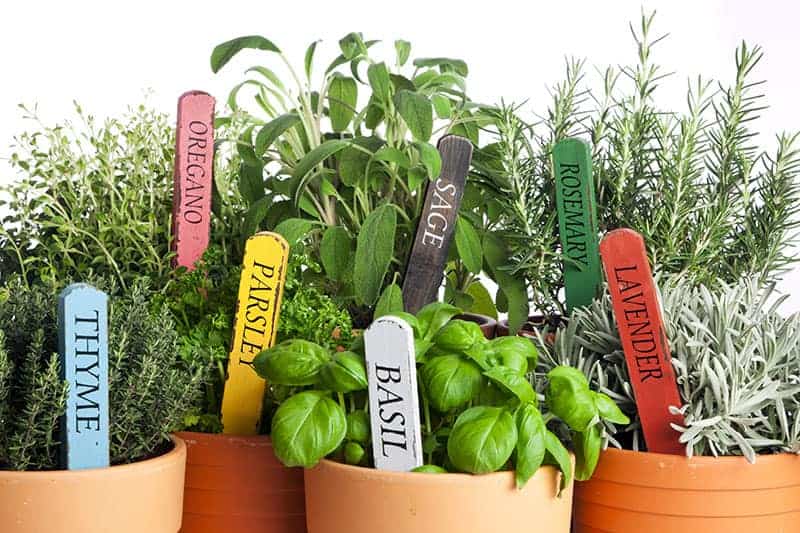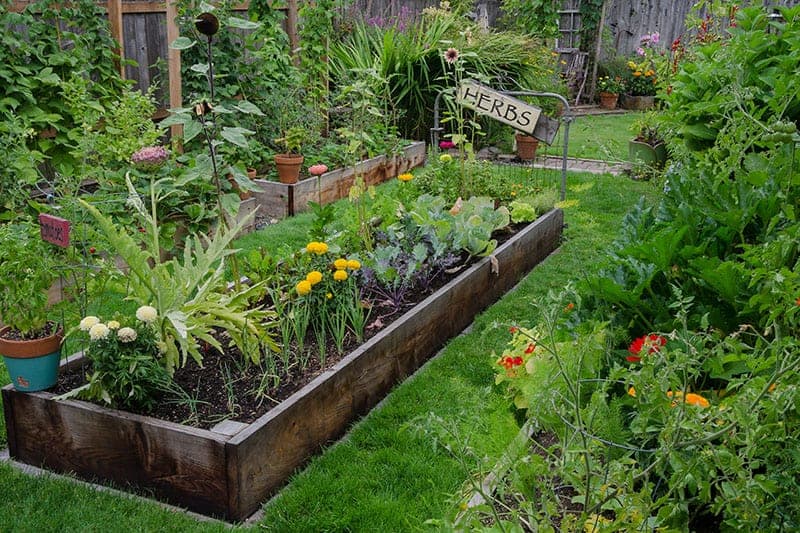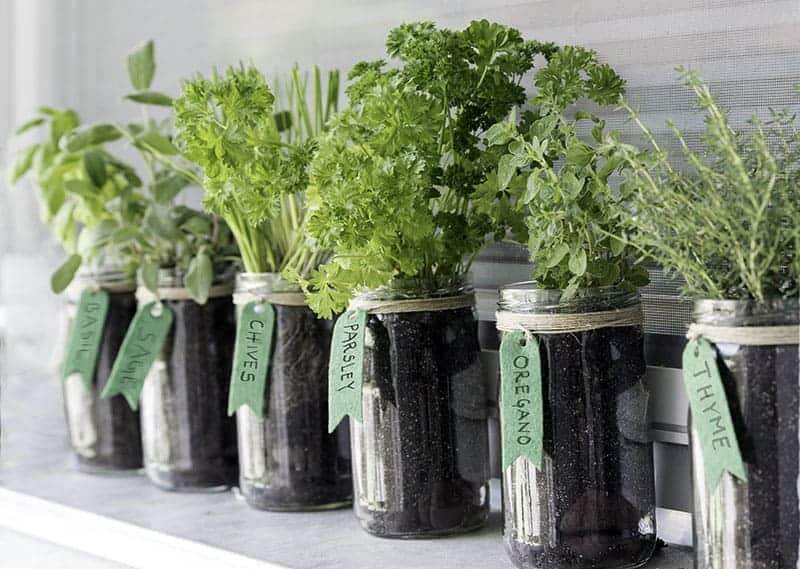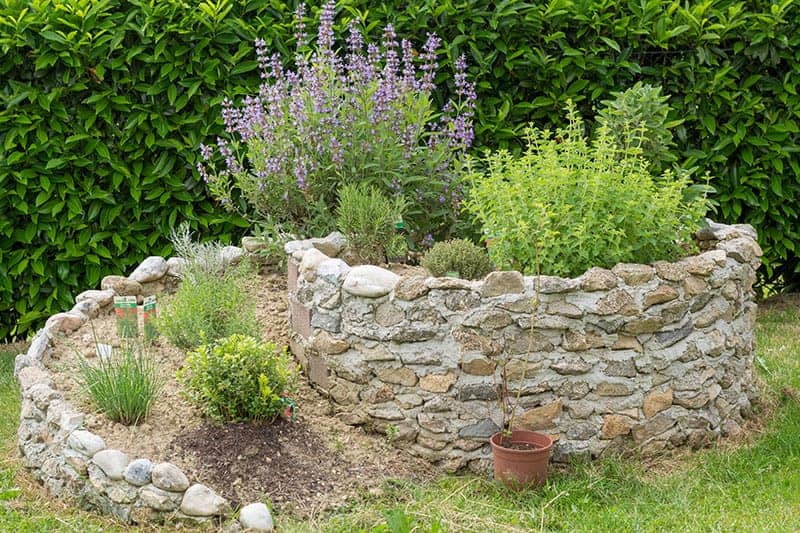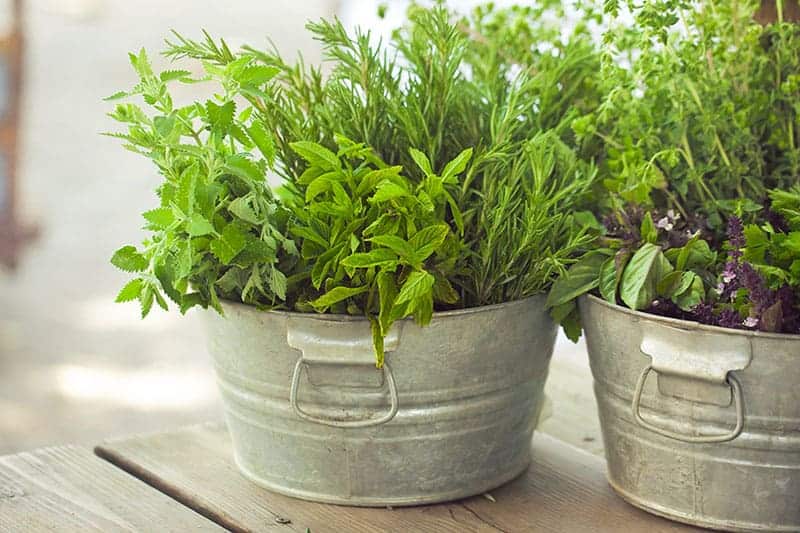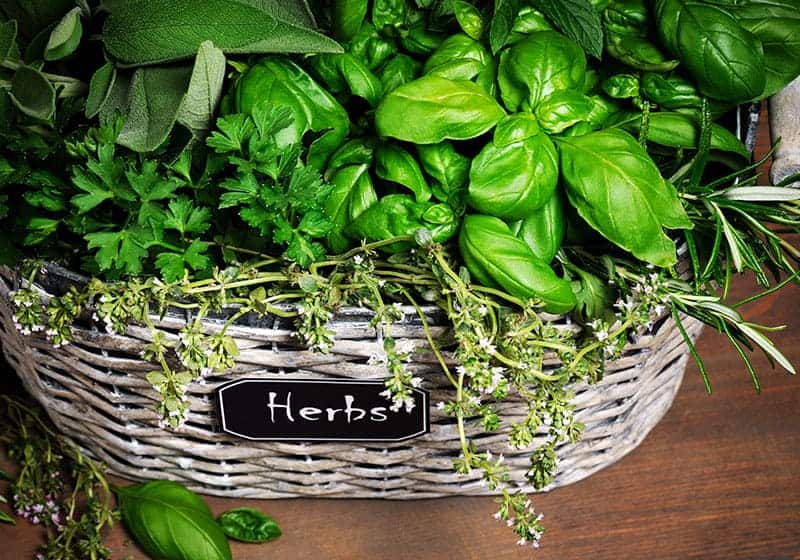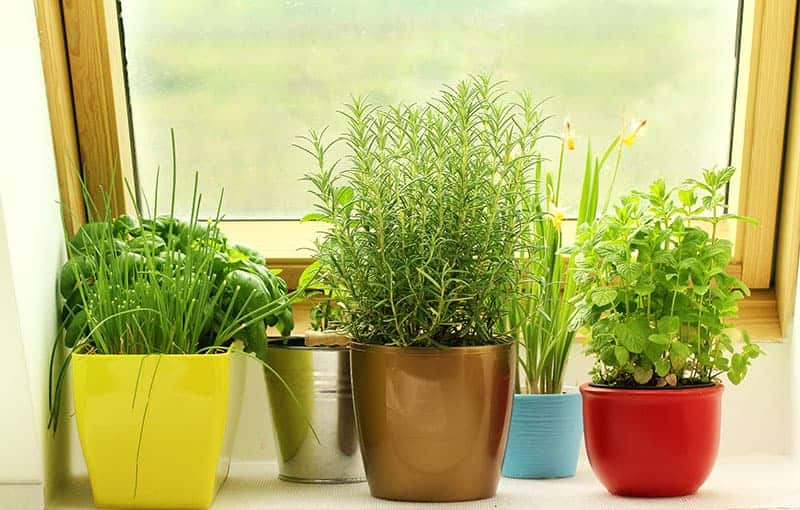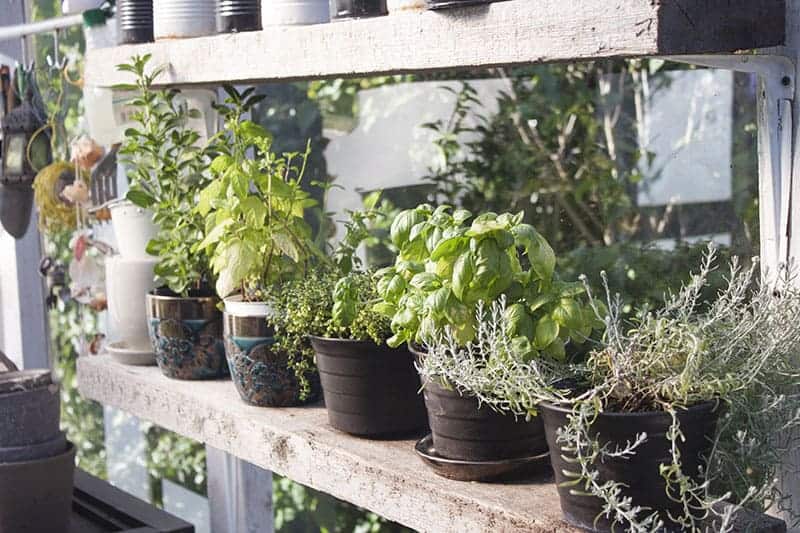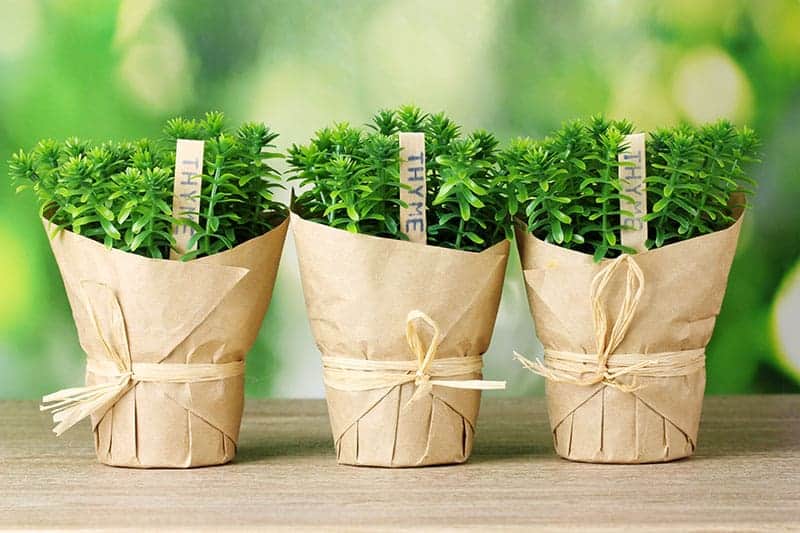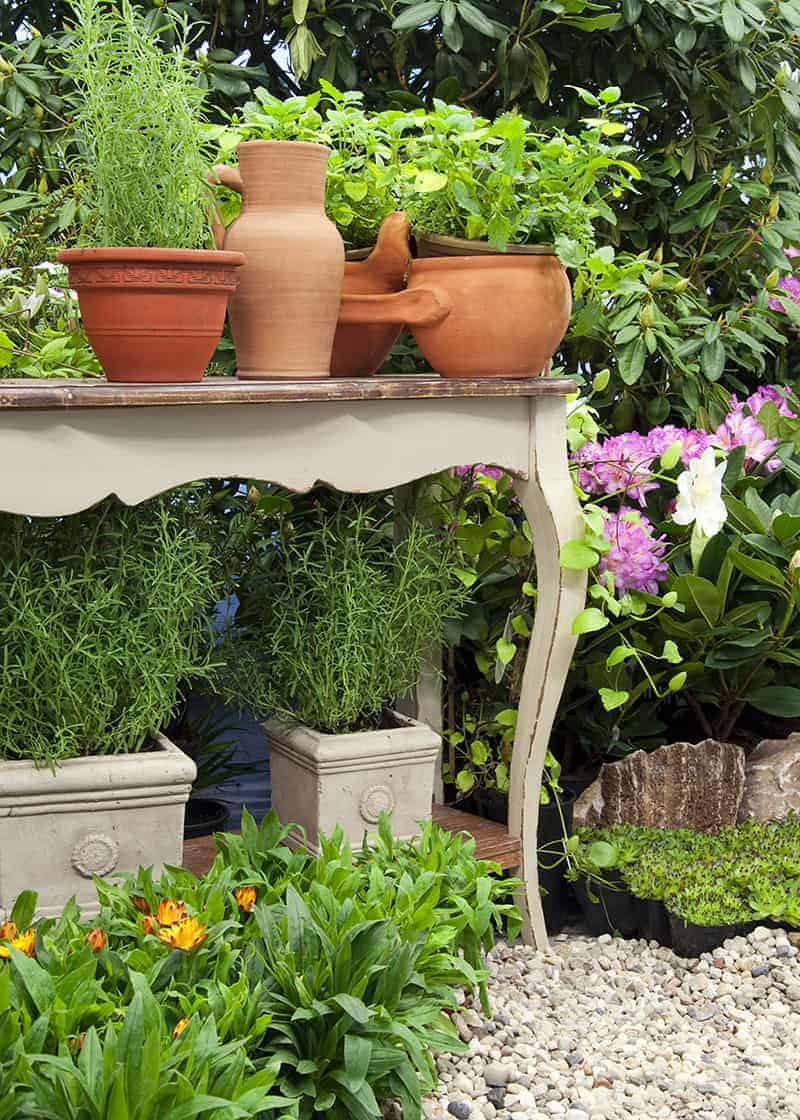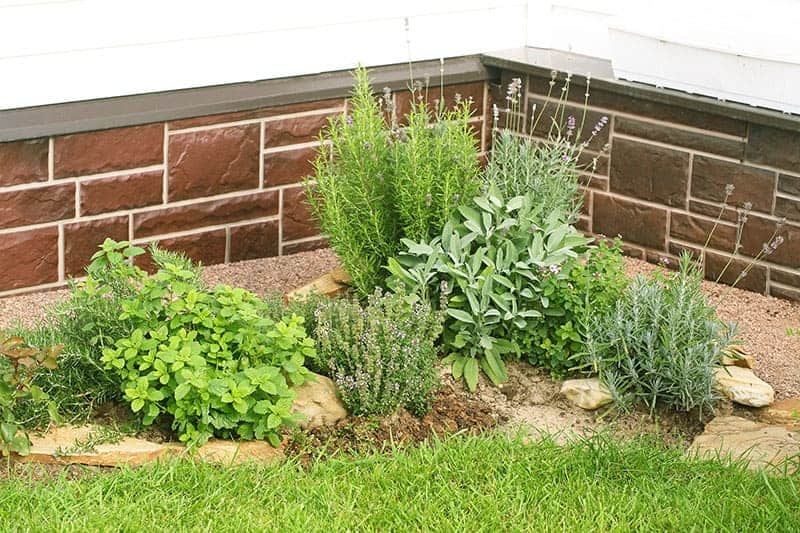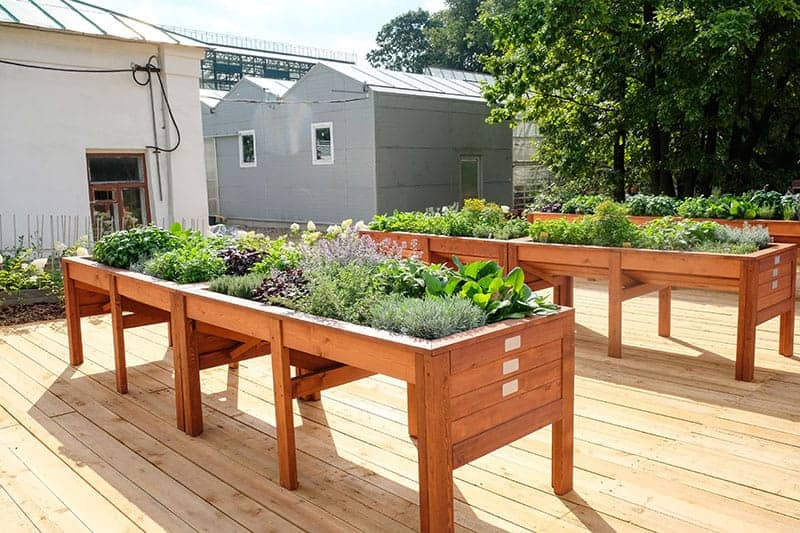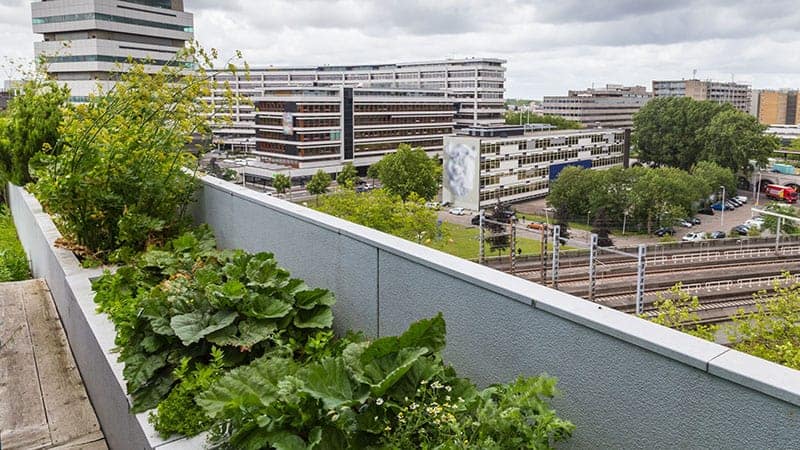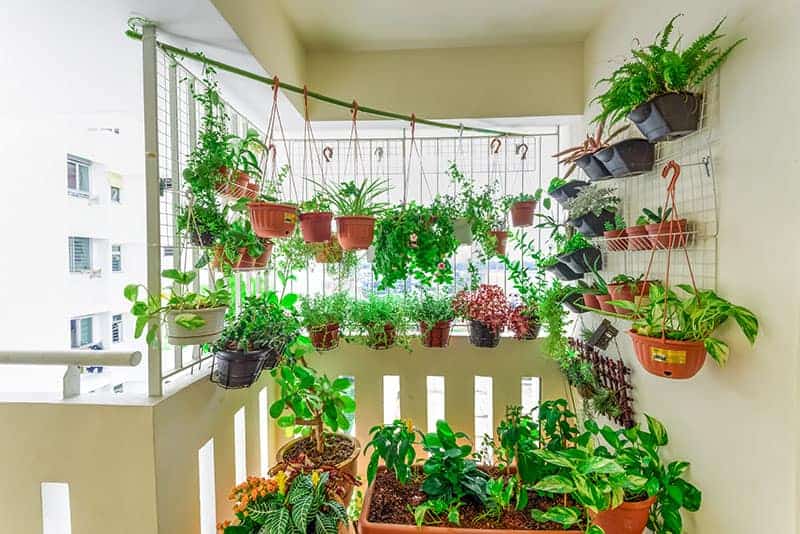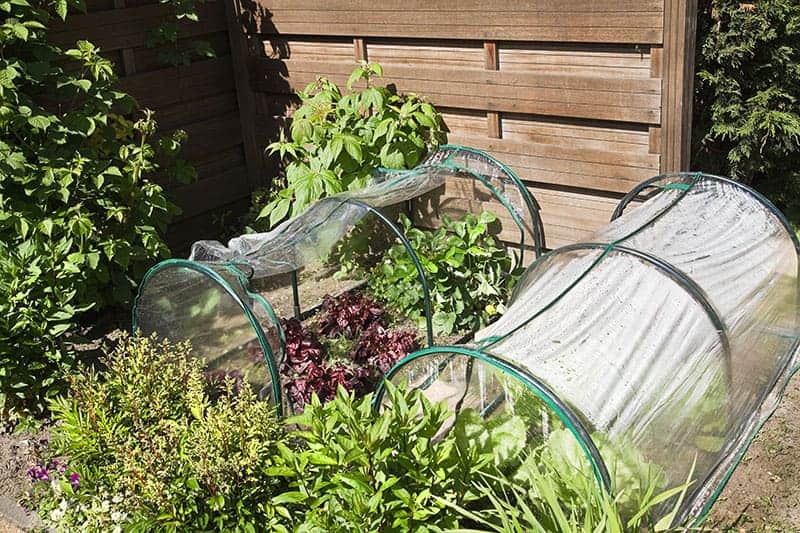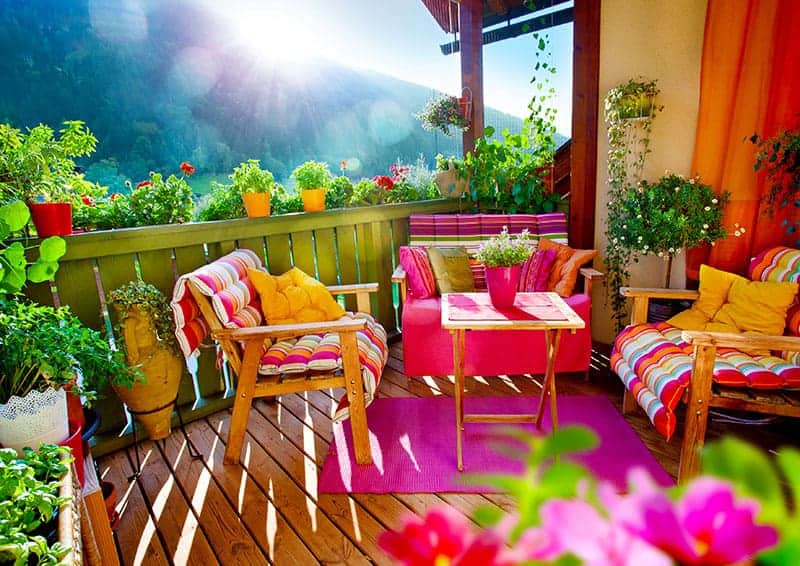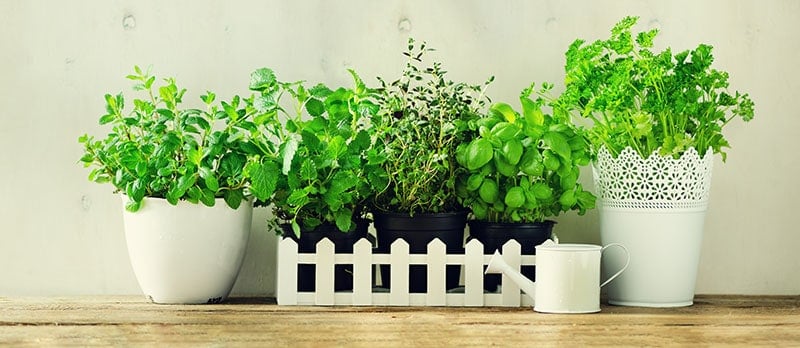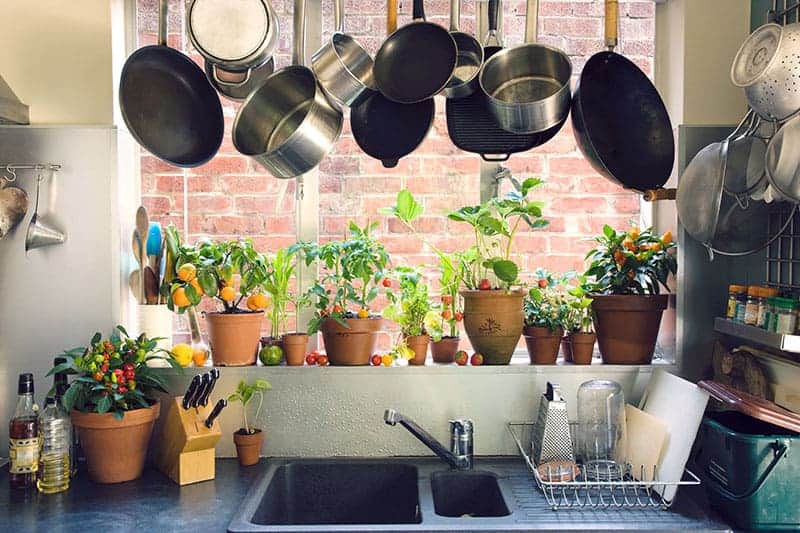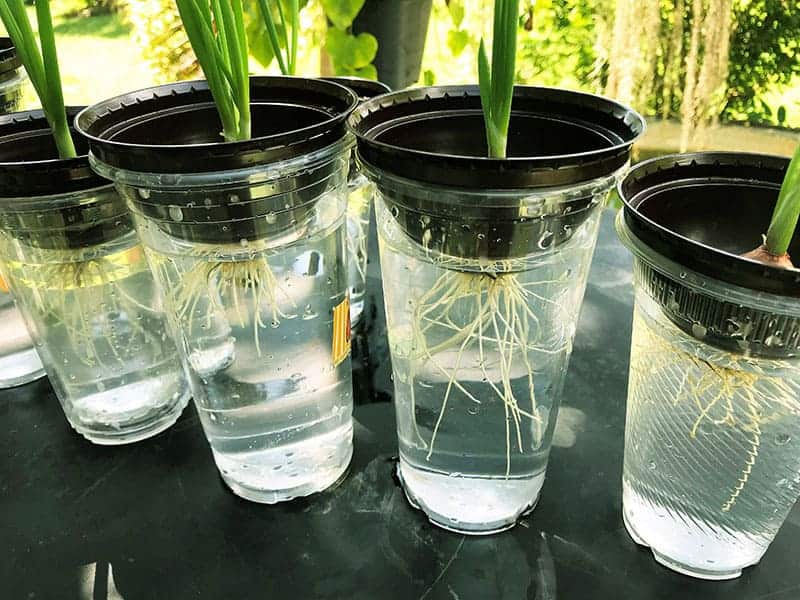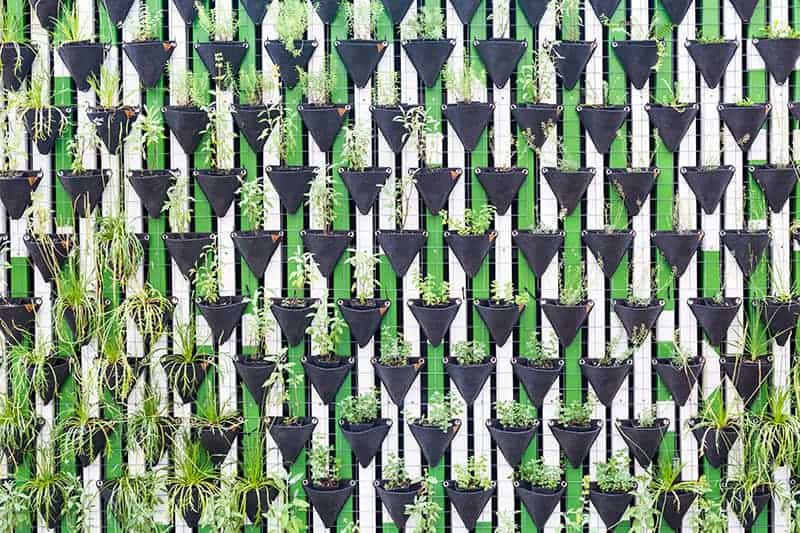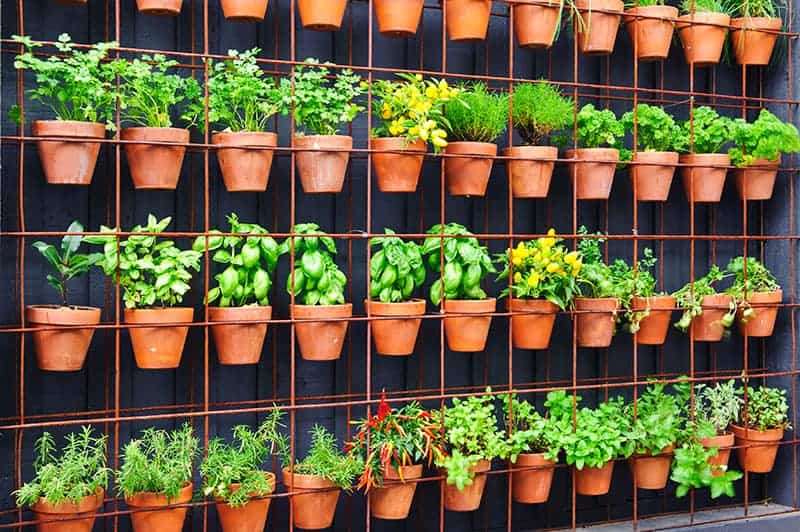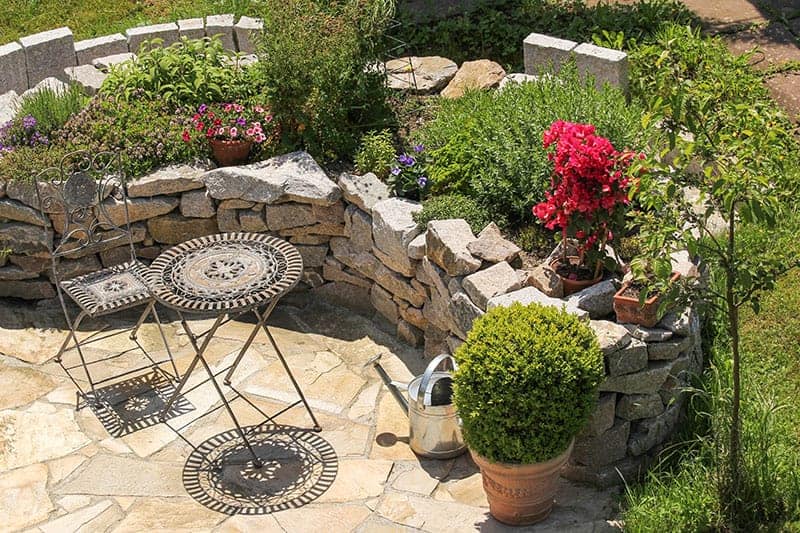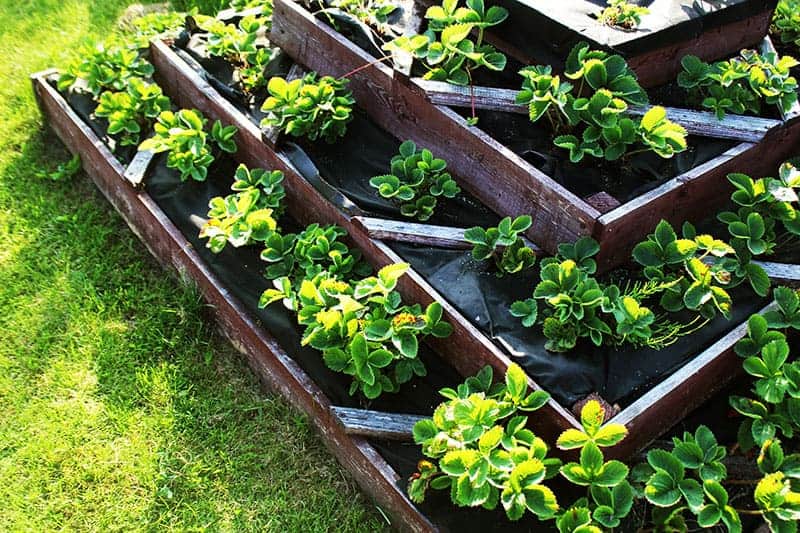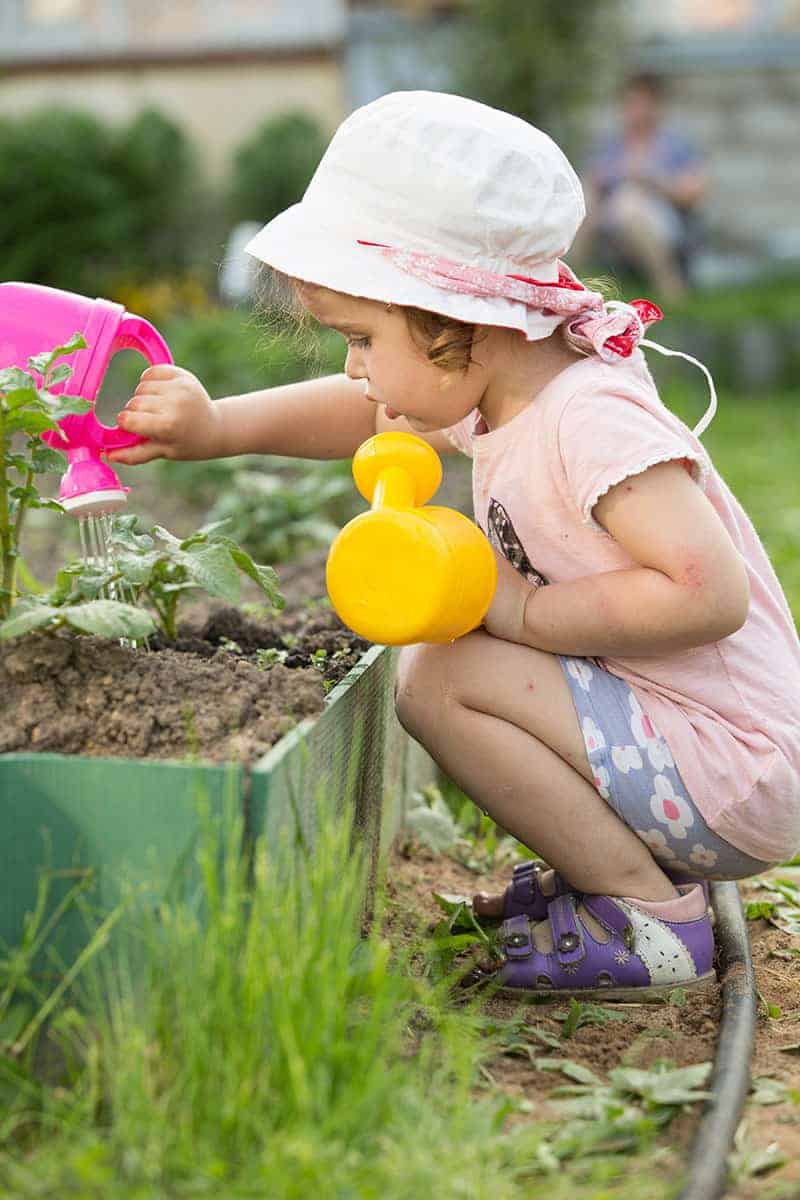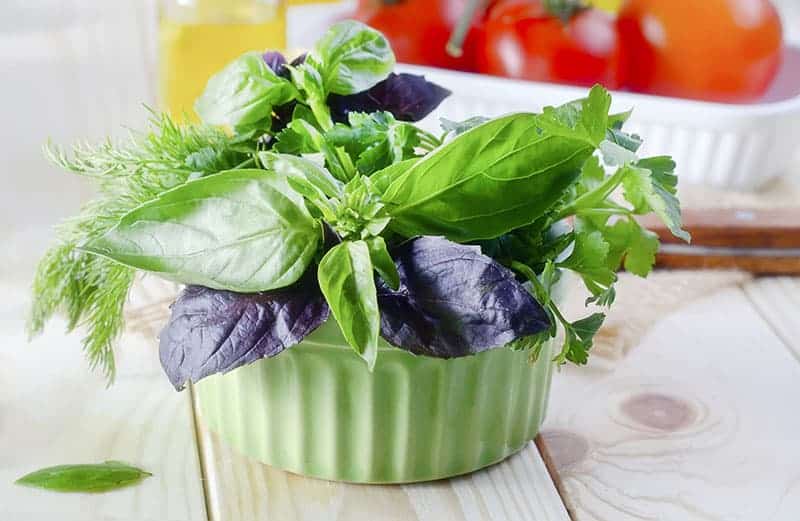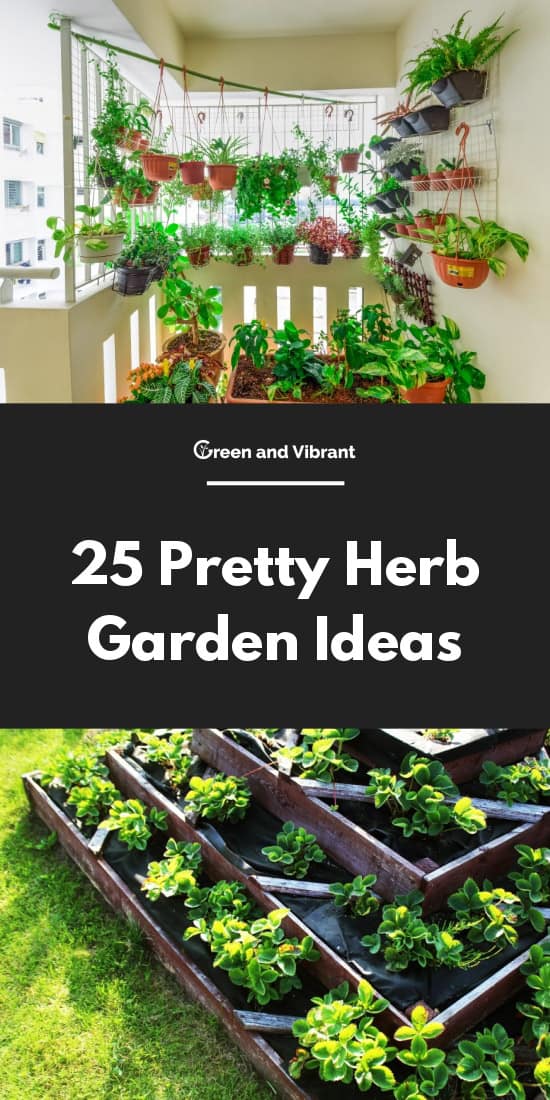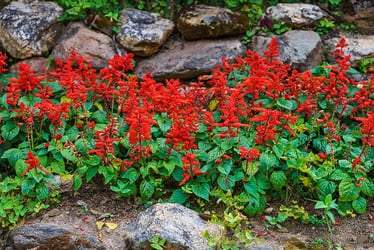If you’ve been thinking of adding some plants to your sleeping quarters, t... Read More
- Home >
- 25 Pretty Herb Garden Ideas
25 Pretty Herb Garden Ideas
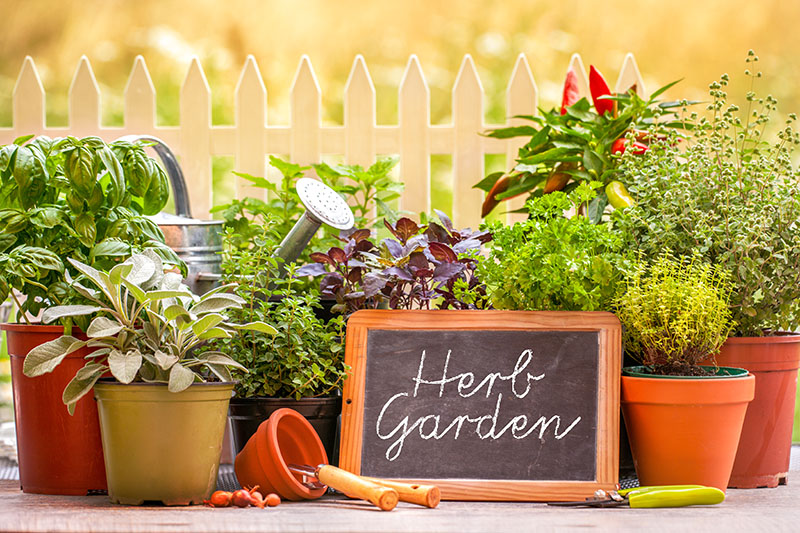
Growing herbs is an increasingly popular hobby, owing to its relative simplicity and the small amount of space needed.
If you’re interested in growing your own herbs, check out these 25 herb garden ideas for inspiration on how you could incorporate these healthy plants into your lifestyle.
Herb Garden Varieties
1. Herb Potting
An easy way to make an herb garden is by using individual terracotta pots for each herb plant and grouping them together. These pots are readily available at garden centers and hardware stores and are generally low cost. They are suitable for keeping indoors and outdoors, making them very versatile. You could move them outside to encourage growth during warm summer months, and bring them back inside during winter to protect them from the elements if you live in a colder climate.
2. Raising Herbs
Building a raised bed for your herb garden can be as simple or as extravagant as you want it to be. The walled edges can be built from old planks of wood you have laying around, or repurpose old pallets and cut the planks down to size for your raised herb bed. If you’re not into the rustic look, you can buy short fence-like edging strips from home and garden stores, fit them into place and fill the middle with soil to create your raised bed. Plant your herbs, leaving growing room between each one, and remember to label them.
3. Re-Use, Reduce, Recycle
Repurposing old mason jars is a stylish and sustainable way to house your herb plants. It’s very cost-effective and can look quite striking when all of the jars are lined up in a row. You can get creative with the labels, using ribbon and printed tags, stickers, or garden string and handwritten labels for a more rustic look.
4. Round the Twist
Planting your herbs into a spiral design in your backyard is a clever way to ensure the plants are benefitting from optimum growing conditions. All herbs require slightly different treatment, with some enjoying constant sunlight, and others preferring occasional shade. With an elevated spiral, you can plant sun-loving herbs at the very top, to ensure they receive full sun. Plant herbs that like more moisture at the bottom, as this is where water will run down to. Herbs that require minimal water can sit at the top, benefitting from better drainage. Spiral garden beds can also create a visual centerpiece for your backyard.
5. Portable Planters
You can create an herb garden in almost any hollowed out structure that you find in your home or garage. This galvanized oversized bucket makes for an industrial feel for a selection of planted herbs, but you could also house herbs in old watering cans, teapots, mugs, paint tins, or even ice cream tubs. One trick is to drill a hole in the underside of your chosen container to ensure herbs don’t become waterlogged.
Planting all of the herbs together in one portable unit makes easy work of moving them inside or outside depending on the weather.
6. Basket Case
Herb gardens make pretty features within the home, and also contribute to making the air a better quality. Plant up a selection of your favorite herbs in a plastic container, and then place it in a more attractive outer shell for display in your kitchen or dining area. A woven basket makes for a homely, traditional look, while an old wooden wine box or fruit box will lend itself to a more rustic style. You can get creative with your herb garden containers, using paint on old vases or tins to update them and make them complement your decor.
7. Stand Out
A unique looking herb garden can be achieved by simply using various pots that you already own. Mismatched pots housing different herb plants can give a vibrant and colorful look in your kitchen, or outside in your backyard. Using pots of different styles and sizes lends itself to an eclectic look, which you can completely personalize to suit your individual taste. Arrange the pots in a haphazard way to give a casual feel, avoiding symmetry or height order.
8. Healthy Shelf-y Herbs
If you’re tight for space in your backyard, then a shelf is a great solution for a place to keep your herbs. You can hang a shelf from a wall, wooden fence, or even metal railings, to create extra surface space for herb pots and other flowers or plants.
You can buy purpose built garden shelves, or you can build your own with some planks of wood and metal brackets to hold them in place. If you make your own shelves, be sure to treat the wood to ensure longevity. Then simply line up your herbs on the shelves and enjoy.
9. Herb Warming
Herb plants make excellent gifts, especially for housewarming occasions, which are a slight change from the usual gift of flowers or house plants. Select your herb plant with your recipient in mind, by choosing an herb that will complement their taste in food. For example, a fan of Italian food may appreciate a basil plant, while a fish lover might enjoy dill. Wrap the plant in brown paper for a cute but rustic look; brown paper makes perfect wrapping paper as it is stylish and understated, plus completely recyclable, unlike many store-bought wrapping papers. This is a particularly good gift for anyone who appreciates sustainable gifts, as it will continue to grow and be used for months or even years to come.
10. Outdoor Tables
To create more surface space in your backyard, use a table to stand your herb pots on. If carefully positioned to consider sunlight and shadows, you can place the table on top of other plants to maximize space. You could use an outdoor table specifically designed for outside use, such as a treated wooden table, or you could make use of old unwanted furniture from your garage, or from friends or family members. Metal tables make for great outdoor tables as they sustain much less wear from rain and sun, though wooden tables can be used outside, but expect them to look quite rustic very quickly if they haven’t been treated for outdoor use.
11. Corner Creation
Creating an herb corner in your backyard is a good way to keep your herbs separate from other plants and flowers. If you have children or pets who play in your backyard, then select a corner which is tucked away to ensure the herbs are protected. You will also want to choose a corner which is not near a path or area that frequently gets foot traffic. Also, bear in mind when choosing an herb corner that the plants will need natural sunlight, so they shouldn’t be in a corner which will always be shadowed by a fence or wall.
12. Planting Tables
Tables are not just for inside the home, with planter tables being a brilliant solution for people who love to garden but do not want to spend time on their knees to prune the plants. Purpose built planter tables can be purchased from garden centers and hardware stores in various styles and sizes to suit your specific requirements. Planter tables are a good place to create an herb garden for people who enjoy warmer climates all year round. If you experience cold weather with frost or snow during winter, then a planter table may not be a convenient place to house herbs, as it cannot be easily moved.
13. Rooftop Garden
Even people who live in apartment buildings can have outside herb gardens, by planting herbs in pots and placing them on balconies or rooftop spaces. As long as the herbs can enjoy a decent amount of natural sunlight, then they will thrive even in the most unlikely areas. Herbs do tend to be less hardy than many other plants, so also try to ensure they are protected from strong wind or heavy rainfall. They will need to be brought indoors during colder months or adverse weather, so it’s always a good idea to use a portable container to make this transition less hassle, especially if you will be carrying the plants up and down flights of stairs in an apartment block.
14. Hang On
If you are the lucky owner of a balcony, but have limited floor or surface space for herbs, creating a hanging herb garden could be a useful solution. You can create extra space by fixing hooks to your walls from which hanging baskets can be suspended. Alternatively, fix a pole from one side of your balcony to the other in a similar style to a wardrobe rail, and dangle hanging baskets filled with herbs from it. You can use traditional bought hanging baskets, or find ways to suspend pots you already own with rope and hooks.
15. Protective Polytunnel
Polytunnels are an excellent choice for your garden if you want to keep herb plants outside all year round. Polytunnels come in many sizes and are made of polythene, a cheap but hard wearing plastic which will protect your plants from adverse weather, pests, and animals. They also retain heat and create a humid atmosphere, much like a greenhouse, warming the soil for earlier planting and increased growth. Polytunnels can be easily removed when necessary, and reused for other areas of your garden.
16. Balcony Garden
Develop an herb haven on your balcony by covering every possible surface with potted herbs and planters. Introduce fairy lights and soft furnishings in bold colors to give a luxurious and magical feel. The scents of the herbs will contribute to creating an appealing environment where you will want to spend more and more time. Outdoor rugs and cushions will help to make your herb balcony more comfortable, though remember to buy specially designed outdoor soft furnishings, or bring them inside when they’re not being used.
17. Fenced In
This quirky herb garden has taken the idea quite literally, by putting a miniature picket fence around the potted herbs. This is a good example to show how creative and inventive you can get with your herb garden, using it as a way to express yourself and an extension of your identity. Experiment with different ideas, such as using alternative pots, or wrapping containers in wallpaper or fabric for a new look. If you’d like to make your own picket fence for your herb garden, look online for miniature fence panels, or think outside of the box by using dolls house furniture or pieces from your child’s toy collection to create your own mini forest with herbs.
18. Windowsill Wonder
One of the best things about herb gardens is that they are so versatile, and can be made to be so compact that anyone can enjoy one. You don’t even need to have access to outside space to have an herb garden, all you need is a windowsill and some natural light. If you enjoy using s variety of herbs in your cooking, then you could turn a whole windowsill into an herb garden, potting up a row of herb plants. If you’re new to herb growing, start small with something like a basil plant on your windowsill to see how you get on. They are surprisingly easy to grow, with very little attention needed.
19. Growing in Water
Hydroponics is an increasingly popular way to grow plants without the use of soil, which might be very appealing if you don’t like the potential mess of having soil in your home. You can grow herbs in any number of containers, such as plastic cups or glass tumblers. The herbs are grown in a solution of water and nutrients, and it’s fascinating to watch the roots grow through the water if your hydroponics experiment is successful. Grow your hydroponic herb garden on a windowsill or in a greenhouse for the best growth rates.
20. Paint it Green
Making a green wall in your backyard is a real statement, and can be achieved in a variety of ways. Fix wall planters in a desired pattern on your wall and fill with herbs of different kinds for a vibrant green wall. For added impact, you could paint the wall underneath in a bright shade of green, or alternatively paint a striking pattern on it, such as stripes or a geometric design.
21. Vertical Gardening
Vertical gardens are growing in popularity due to the clever use of space they occupy. Vertical gardens can be achieved in a number of ways, by using shelf units lined up on your garden wall, or by fixing pots onto a large vertical metal frame. Although vertical gardens are popular among owners of small backyards, a vertical herb garden can make a great feature even in large gardens. Vertical gardens are also an efficient use of energy; by watering from the top, unused water from highest herbs drains through and drops onto herbs below, rather than being wasted elsewhere.
22. Helpful Herbs
Installing an herb garden alongside the space you use for dining in your backyard can improve your enjoyment of meal times. Not only will the herbs provide a pleasant fragrance for you to enjoy, but by carefully selecting the right herbs, you will be able to keep nuisance flies and insects at bay. Herbs known to repel pests include basil, lemongrass, mint, and rosemary.
23. Tiered Herb Garden
Growing herbs in raised beds on several tiers has both aesthetic and practical benefits. This pyramid style of bed makes it easier to access the top herbs than if they were all flat on the same level, as they would be difficult to reach at the back for pruning and picking without disturbing the herbs at the front. It also enables you to keep different herb varieties separate for easy identification. Similarly to the spherical raised beds, it would be beneficial to place herbs that require less water at the top of the pyramid, as these will drain more quickly while keeping the thirstiest herbs on the lowest tier
24. Gardening with Kids
Herbs are the perfect way to get children interested in gardening. They grow very quickly, so children can reap the rewards of their efforts much faster than when growing fruit and vegetables. Your herb garden for children doesn’t need to be fancy or pretty; it just needs to be safe and easily accessible for small hands. Gardening has numerous benefits for children, improving focus, relieving stress, and encouraging an interest in a healthy diet.
25. Theme It
If you have a particular interest in a certain cuisine, allow your herb garden to reflect this. You could have an Italian themed herb garden, growing basil and oregano, or go for something a little more oriental with lemongrass and coriander. You could decorate your herb garden to match your choice of herbs, with pots colored to match the national flag.
Growing herbs is a cost-effective way to add new flavors to your cooking, while the simple process of successfully growing your own food is a joy and achievement in itself.
Related Content
-
8 Best Bedroom Plants That Purify The Air & Improve Your Sleep Quality
-
7 Best Orchid Pots & Containers – Buying Guide & Recommendation
Orchids can be tricky plants to care for. They like specific conditions to... Read More
-
Growing Lettuces At Home – What You Need To Know
Lettuces are such popular plants and dishes around the world that it's so ... Read More
-
10 Best Pressure Canners to Preserve Food in 2024
We reviewed over 40 pressure canners to find the top 10 picks. Take a look... Read More
